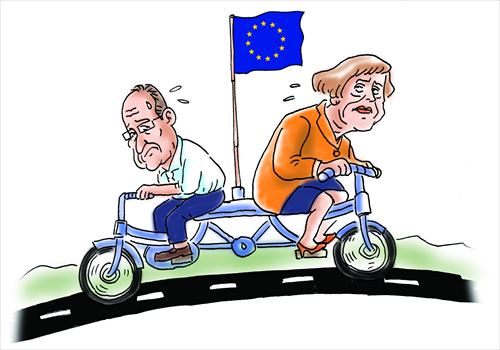EU unity is cracking under force of Berlin’s political dominance

Illustration: Liu Rui/GT
The most recent bailout agreement signed between Greece and other European countries last week might represent a time out from a steadily worsening Greek debt crisis. However, many believe that underneath the image of temporary peace, Pandora's Box has already been opened, with growing cracks within the EU gradually unveiled.
The new deal is a tentative solution for the crisis, yet it is a third bailout in five years, and highly likely won't be the last, with a number of problems left unanswered. Whether Athens could fully implement the agreement, which requires pension cuts, tax increases, and other austere measures, and whether the Greek society can withstand such changes and pressure, will pose a great challenge to the EU and the eurozone.
More importantly, the contradiction between Germany and France has come to light, and is likely to continue.
France itself also has serious debt problems. But as a major power that holds sway in the eurozone, nobody dares to challenge the country over this issue. In such a scenario, Berlin's tough stance on Greek debt this time, especially the proposal of a temporary Grexit, is also a warning to Paris.
As the largest creditor in the EU, the last thing Germany wanted is to witness more economies to repudiate their debts after Greece.
France, on the other hand, by questioning and opposing the German position publicly, while placing a strong emphasis on keeping Greece in the eurozone, has won support from countries that are not pleased with Berlin's tough approach. In the end, it has played a balancing role against Germany's rising influence.
As a matter of fact, since the establishment of the eurozone, such discord between France and Germany has been unfolding.
The Franco-German axis, the driving engine of European integration, was dominated by Paris at the very beginning. At that point, France had more resources and power than Germany. The former is a permanent member of the UN Security Council, a victorious country in WWII, and once had impressive economic development for quite some time. But Germany had only limited influence.
Since the European debt crisis, however, Germany has become the largest creditor in the region. Given the logic of reality, whoever pays more money holds a more powerful sway. Therefore, Berlin has gradually gained the dominance over the economic issues.
Simultaneously, whether intentionally or otherwise, Germany has started to transform its economic influence into more political power, trying to assume leadership politically.
Traditionally, Britain, France and Germany are the top three major powers in Europe. Yet the UK is busy debating an "in-out referendum" about its EU membership, while France's influence is declining. Against such backdrop, the Greek crisis tossed out a question - will Europe become "Germany's Europe" in the future? Facing the question, France knows it has to react swiftly. Especially after the German proposals seen by many as "punishing" Greece, other eurozone nations with similar debt woes may feel a sense of crisis. Over time, they will gather around France.
Germany, meanwhile, has lost some points over the issue, for being too tough and showing little willingness to accept others' opinions. It has to learn some lessons from this, otherwise, next time when a new problem emerges, it will prove to be hard for Germany to exert its influence within Europe.
The author is director of the Department for European Studies, China Institute of International Studies. opinion@globaltimes.com.cn